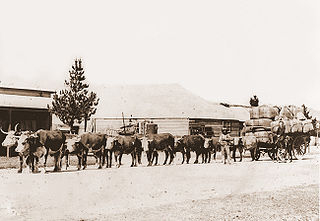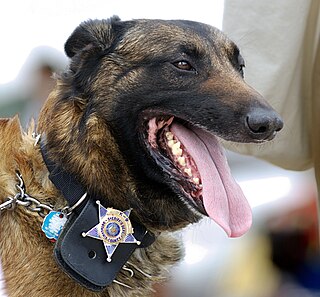
The Boeing E-3 Sentry is an American airborne early warning and control (AEW&C) aircraft developed by Boeing. E-3s are commonly known as AWACS. Derived from the Boeing 707 airliner, it provides all-weather surveillance, command, control, and communications, and is used by the United States Air Force, NATO, French Air and Space Force, Royal Saudi Air Force and Chilean Air Force. The E-3 has a distinctive rotating radar dome (rotodome) above the fuselage. Production ended in 1992 after 68 aircraft had been built.

The Labrador Retriever or simply Labrador is a British breed of retriever gun dog. It was developed in the United Kingdom from St. John's water dogs imported from the colony of Newfoundland, and was named after the Labrador region of that colony. It is among the most commonly kept dogs in several countries, particularly in the Western world.

The Special Boat Service (SBS) is the special forces unit of the United Kingdom's Royal Navy. The SBS can trace its origins back to the Second World War when the Army Special Boat Section was formed in 1940. After the Second World War, the Royal Navy formed special forces with several name changes—Special Boat Company was adopted in 1951 and re-designated as the Special Boat Squadron in 1974—until on 28 July 1987 when the unit was renamed as the Special Boat Service after assuming responsibility for maritime counter-terrorism. Most of the operations conducted by the SBS are highly classified, and are rarely commented on by the British government or the Ministry of Defence, owing to their sensitive nature.

The Australian contribution to the war in Afghanistan has been known as Operation Slipper (2001–2014) and Operation Highroad (2015–2021).

A police dog, also known as a K-9 ,is a dog that is trained to assist police and other law enforcement officers. Their duties may include searching for drugs and explosives, locating missing people, finding crime scene evidence, protecting officers and other people, and attacking suspects who flee from officers. The breeds most commonly used by law enforcement are the German Shepherd, Belgian Malinois, Bloodhound, Dutch Shepherd, and Labrador Retriever. In recent years, the Belgian Malinois has become the leading choice for police and military work due to their intense drive, focus, agility, and smaller size, though German Shepherds remain the breed most associated with law enforcement.

The PDSA Dickin Medal was instituted in 1943 in the United Kingdom by Maria Dickin to honour the work of animals in World War II. It is a bronze medallion, bearing the words "For Gallantry" and "We Also Serve" within a laurel wreath, carried on a ribbon of striped green, dark brown, and pale blue. It is awarded to animals that have displayed "conspicuous gallantry or devotion to duty while serving or associated with any branch of the Armed Forces or Civil Defence Units". The award is commonly referred to as "the animals' Victoria Cross".

A detection dog or sniffer dog is a dog that is trained to use its senses to detect substances such as explosives, illegal drugs, wildlife scat, currency, blood, and contraband electronics such as illicit mobile phones. The sense most used by detection dogs is smell. Hunting dogs that search for game, and search and rescue dogs that work to find missing humans are generally not considered detection dogs but fit instead under their own categories. There is some overlap, as in the case of cadaver dogs, trained to search for human remains.

The Royal Air Force Police (RAFP) is the service police branch of the Royal Air Force, headed by the provost marshal of the Royal Air Force. Its headquarters are at RAF Honington and it deploys throughout the world to support RAF and UK defence missions.

The United States Air Force Security Forces (SF) are the ground combat force and military police service of the U.S. Air Force and U.S. Space Force. The USAF Security Forces were formerly known as Military Police (MP), Air Police (AP), and Security Police (SP) at various points in their history. Due to its significant ground combat mission, Security Forces are sometimes regarded as Air Force infantry. They were formed on the premise of being the Air Force's "Marine Corps", in that they would provide security for the Air Force similar to how the Marines provide security for the Navy.

The Royal Army Veterinary Corps (RAVC), known as the Army Veterinary Corps (AVC) until it gained the royal prefix on 27 November 1918, is an administrative and operational branch of the British Army responsible for the provision, training and care of animals. It is also responsible for explosives and drug search dogs. It is a small corps, forming part of the Army Medical Services.

A working animal is an animal, usually domesticated, that is kept by humans and trained to perform tasks instead of being slaughtered to harvest animal products. Some are used for their physical strength or for transportation, while others are service animals trained to execute certain specialized tasks. They may also be used for milking or herding. Some, at the end of their working lives, may also be used for meat or leather.

Dogs have a very long history in warfare, beginning in ancient times. From being trained in combat, to their use as scouts, sentries, messengers, mercy dogs, and trackers, their uses have been varied, and some continue to exist in modern military usage.

The Royal Australian Air Force's Air Combat Group (ACG) is the group which administers the RAAF's fighter and bomber aircraft. ACG was formed on 7 February 2002 by merging the RAAF's Tactical Fighter Group and Strike Reconnaissance Group in an attempt to improve the speed with which the RAAF can deploy its combat aircraft.

857 Naval Air Squadron, was a Fleet Air Arm (FAA) naval air squadron of the United Kingdom’s Royal Navy (RN). It was established at Squantum in the United States as a Torpedo Bomber Reconnaissance squadron in April 1944. It boarded HMS Rajah in June, landed in HMS Gadwall, RNAMY Belfast, Northern Ireland, in July, with anti-submarine training at HMS Landrail, RNAS Machrihanish, Argyll and Bute, Scotland. The squadron re-embarked in September for Ceylon, spending time on land at HMS Garuda, RNARY Coimbatore, India and HMS Ukussa, RNAS Katukurunda, Ceylon, before boarding HMS Indomitable in November. Throughout the winter, using the carrier and HMS Nabbington, RNAS Nowra, Australia as a shore base, the squadron targeted locations in Sumatra, including Palembang, before shifting focus to Sakashima Gunto and Formosa in the spring. The squadron returned to the Far East after VJ-Day to engage Japanese suicide boats off Hong Kong. After leaving its aircraft in Australia, the squadron returned home and was disbanded in November 1945.
Australian Customs Service breeds and trains Labradors to detect illegal drugs, firearms, explosives and hazardous chemical precursors associated with the manufacture or deployment of chemical weapons. Each year these dogs are responsible for hundreds of detections.
Treo was a black Labrador Retriever-English Springer Spaniel crossbreed and a retired Arms and Explosives Search dog with the Royal Army Veterinary Corps. He was awarded the Dickin Medal in February 2010. The military nominated Treo for the award in recognition of his help uncovering a number of improvised explosive devices (IED) during his time serving in Helmand Province, an insurgency hot spot, in 2008. Treo was the medal's 63rd recipient.
Buster, an English Springer Spaniel, was a military detection dog who was active during the Iraq War. Because of his actions in discovering a hidden weapons cache, the dog was credited with saving service personnel from insurgents operating in the southern Iraqi town of Safwan. He was awarded the Dickin Medal, referred to as being the animals' Victoria Cross.

The 1st Military Working Dog Regiment, Royal Army Veterinary Corps is a British Army working dog unit. It is responsible for providing trained dogs and handlers to support British Armed Forces on operations in the UK and overseas.The regiment holds the Army’s only deployable MWD and veterinary capability.

BluePearl Specialty and Emergency Pet Hospital is a company owned by Mars, Incorporated that operates specialty and emergency veterinary hospitals throughout the United States. They currently have hospitals in 29 states, as of early 2022. The firm is one of the largest private providers of approved veterinary residency and internship educational programs in the world, and employs 1,330+ veterinarians, 1,600+ veterinary technicians, and 4,100+ other professionals.

Florida v. Harris, 568 U.S. 237 (2013), was a case in which the United States Supreme Court addressed the reliability of a dog sniff by a detection dog trained to identify narcotics, under the specific context of whether law enforcement's assertions that the dog is trained or certified is sufficient to establish probable cause for a search of a vehicle under the Fourth Amendment to the United States Constitution. Harris was the first Supreme Court case to challenge the dog's reliability, backed by data that asserts that on average, up to 80% of a dog's alerts are wrong. Twenty-four U.S. States, the federal government, and two U.S. territories filed briefs in support of Florida as amici curiae.
















